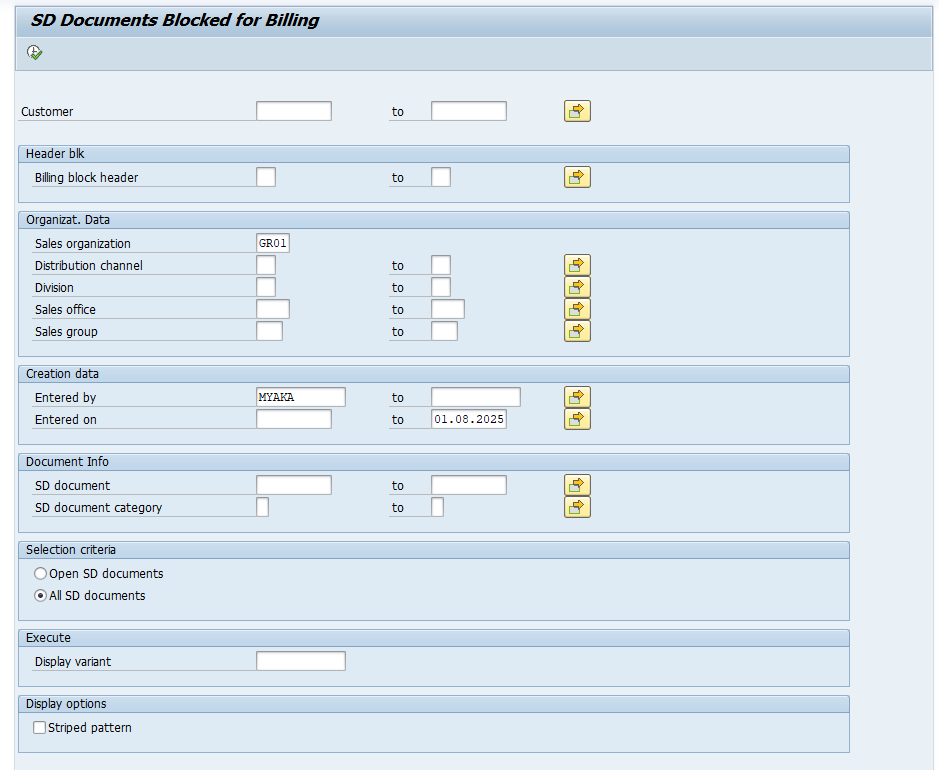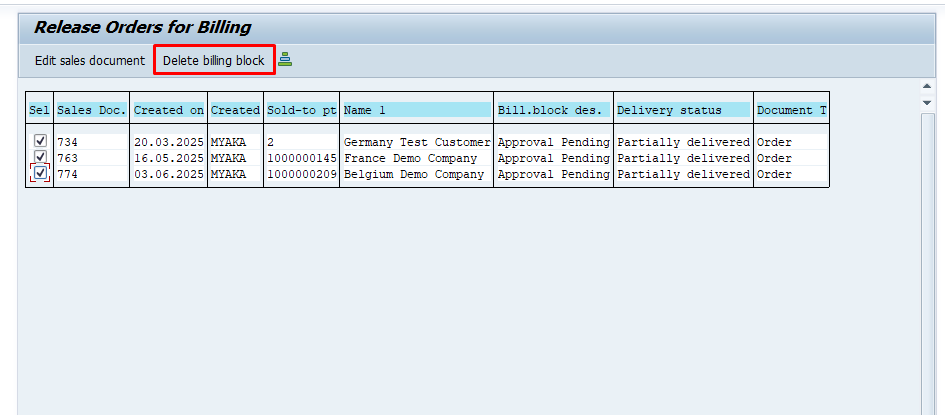Mass Removal of Billing Block in SAP SD
- Mahmut Yaka

- Aug 1, 2025
- 2 min read
🧭 Introduction
In SAP SD, billing blocks are often set intentionally on sales documents like Sales Orders, Debit Memo Requests, and Credit Memo Requests to enforce manual checks before billing. While helpful in control scenarios (e.g. pricing approval, payment term check), they can accumulate and delay billing operations if not cleared promptly.
This guide walks you through:
Identifying billing blocks
Using transaction V.23
Step-by-step mass deletion
Validation using standard tools
🧾 What Is a Billing Block?
A Billing Block is a predefined reason (e.g., "Check Debit Memo", "Price Change Approval") that prevents a sales document from proceeding to billing.
It can be set at:
Header level: Applies to the whole document
Item level: Applies to specific sales line items
🔍 Example – Sales Order with Billing Block:
Billing Block: Z1 – Approval Pending
🔎 Step 1: List All Sales Documents with Billing Block – TCode: V.23
Transaction code V.23 is designed to list and optionally release documents blocked for billing.
➤ Execute V.23
Enter V.23 in the command field and press Enter.
➤ Enter Selection Criteria
You can filter by:
Customer
Sales organization
Date range
Billing block type
Document type (Sales order, Debit/Credit Memo)

➤ Execute the Report
Click the "Execute" button. The result is displayed in ALV grid format listing:
SD Document Number
Billing Block Description
Delivery/Billing status
Document type

🧩 Step 2: Drill Down into Document – Confirm Billing Block
To inspect a billing block in detail, select the relevant sales document in the list and click the “Edit sales document” button at the top.
This action opens the document in change mode (VA02), where you can review the billing block or open a document via VA03 or VA02 to inspect the Billing Block:
Header → Sales Tab
Item overview → Line-level block

🛠 Step 3: Mass Remove Billing Blocks – TCode: V.23 (Action Mode)
➤ Return to V.23
Now run V.23 again, this time check the option:
☑ Delete billing block
➤ Select Documents to Process
In the ALV output, select one or more documents and click “Delete Billing Block”.

✅ Step 4: Validation of Billing Block Removal
➤ Use "Edit Sales Document" Option
You can verify by selecting a document and clicking Edit Sales Document – this opens the sales document in VA02 mode.

✅If the Billing Block dropdown is now empty, removal is successful.
📊 Optional: Technical Table References
To track billing blocks programmatically or via custom reports:
Table | Description | Key Fields |
VBAK | Sales Order Header | VBELN, FAKSK (Billing Block) |
VBAP | Sales Order Items | VBELN, POSNR, FAKSP (Billing Block) |
TVFS | Billing Block Reasons (Customizing) | FAKSP – Reason Code VTEXT – Billing Block Description |
✅ Conclusion
Efficient billing depends on a clean order pipeline. Billing blocks, while essential for business control, need to be actively managed — especially in high-volume environments.
With V.23, you can:
Detect bottlenecks
Clean them up in bulk
Improve billing throughput
Use it smartly, and always validate before mass deletion.
Mahmut Yaka
SAP SD Consultant

Comments